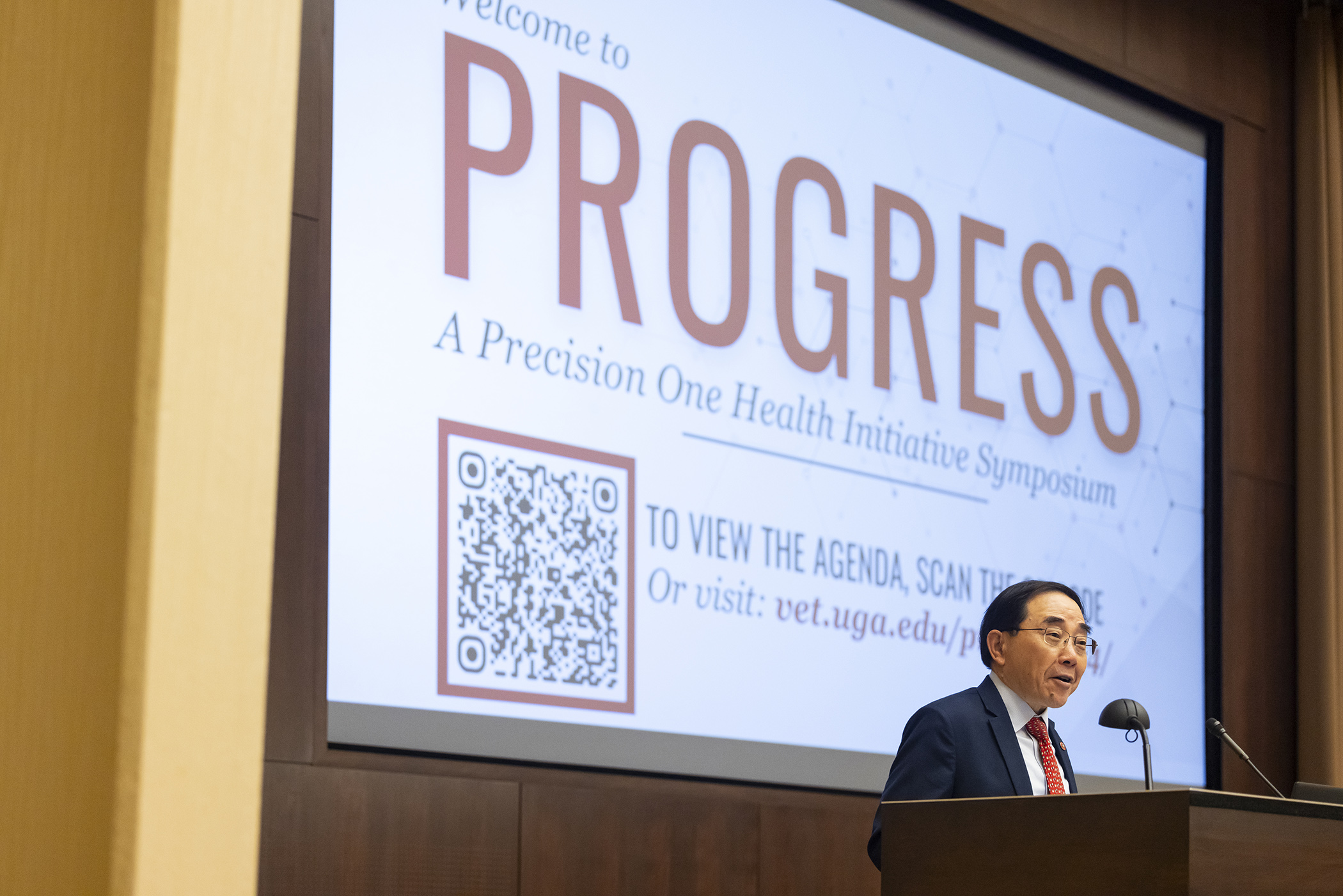Researchers from various colleges and schools across the University of Georgia gathered for the inaugural Precision One Health Symposium to hear updates on collaborative research performed under the umbrella of the POH Initiative. Held Nov. 7 at the UGA Center for Continuing Education & Hotel, the symposium celebrated the early achievements of an interdisciplinary research team exploring the intricate connections among genetics, the environment, and lifestyle factors and their effects on disease prevention and treatment.
“One Health is a collaborative approach that recognizes the health of people, animals, plants and the environment are closely linked and interdependent,” said UGA Senior Vice President for Academic Affairs and Provost S. Jack Hu, in opening remarks. “By working together, we can accelerate the discoveries of cures and then speed up the translation of discoveries to bedside practice.”

With the establishment of the School of Medicine, Hu said UGA is one of 13 universities in the nation with schools of veterinary medicine, human medicine and agriculture on one campus. These three disciplines — plus public health, pharmacy, engineering, arts and sciences, law, agriculture, forestry and natural resources, journalism and mass communication — position UGA to make a unique impact on the holistic concept of one health.
“Today marks an incredible opportunity for all of us to come together and push forward the boundaries of collaborative research that Precision One Health was built upon,” said Dr. Jon P. Mochel, director of the Precision One Health Initiative and professor of systems pharmacology in the College of Veterinary Medicine. “In just one year, we have achieved significant progress, now boasting nearly 24 faculty members, securing close to $10 million of funding, and expanding to over 70 faculty across various colleges and units. It is a testament to the hard work and dedication of everyone involved.”
Research highlighted at the symposium fell into the four categories that form the foundation of POH: translational medicine, systems modeling and data analytics, epidemiology and disease ecology, and social sciences and medicine. Data aggregation emerged as an area key to the success of such a far-reaching collaboration, allowing researchers campus-wide to share findings and build on the work of colleagues.
Lab-based research highlighted at the symposium included the work that Mochel and Dr. Karin Allenspach, professor in the CVM Department of Pathology, are doing with patient-derived tumor organoids — three-dimensional models of diseased tissues. Their work has the potential to speed the development of drugs to treat cancer and other diseases that typically take many years and hundreds of millions of dollars to develop.

Yana Zavros, newly appointed director of research for the UGA School of Medicine, discussed related research into Cushing’s disease during her keynote speech. A rare condition in humans, Cushing’s is a common diagnosis in dogs. A disease of the endocrine system, Cushing’s causes the adrenal glands to flood the body with cortisol, which can lead to stroke, diabetes, obesity, cognitive impairment, anxiety and depression. Using organoid models of canine tumors, Zavros is hopeful that a treatment for the disease can be discovered.
“I have been given this extraordinary honor and responsibility to establish and direct the inaugural research center at the School of Medicine at UGA, and the current goal of the research center is to establish a seamless process and infrastructure that will accelerate the translation of scientific discoveries from the laboratory to the clinic to ultimately increase patient cure, survival and quality of life,” Zavros said.
Dr. Lisa K. Nolan, dean of the College of Veterinary Medicine, called the researchers gathered “beacons of possibility” in her closing remarks to the symposium. “Through the Precision One Health initiative, we are not only driving research but leading the charge in shaping the future of health care,” Nolan said. “The path ahead is bright, and I have no doubt that the work we do together will leave a lasting legacy. And quite frankly, I am really excited to see it.”


